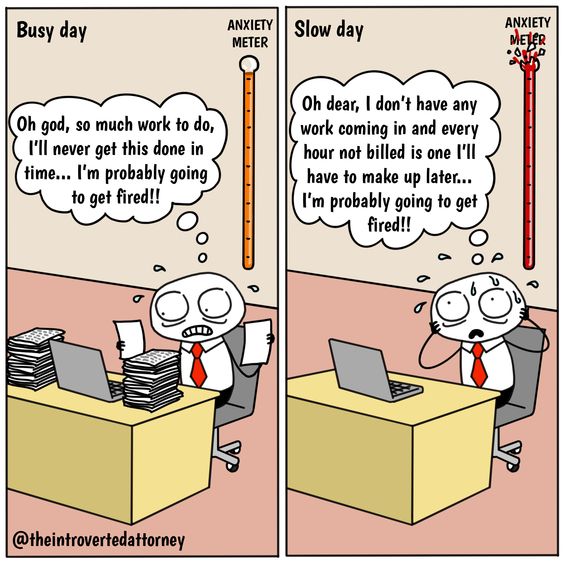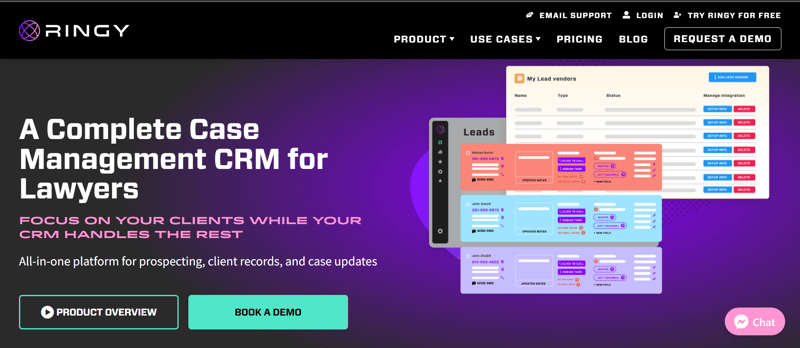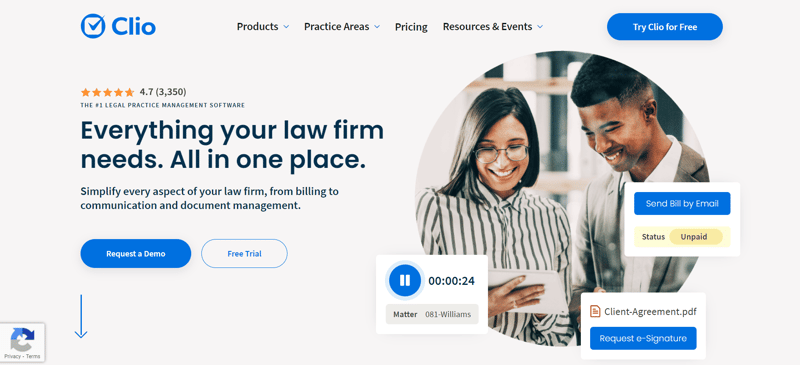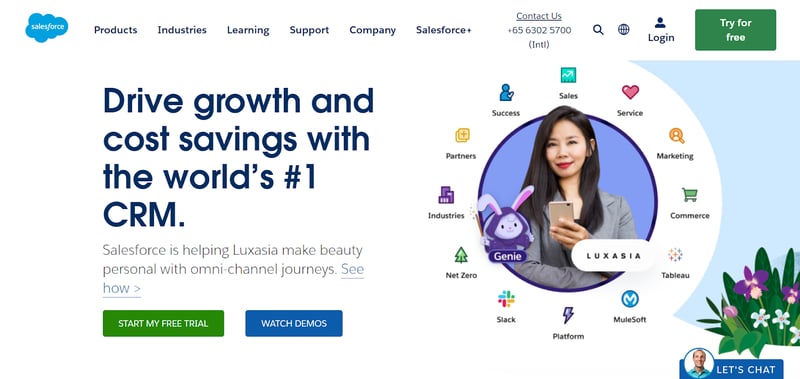
Top 9 Reasons Attorneys and Lawyers Need a CRM for Law Firms
 Updated on
Updated on
 By Katie Bowman
By Katie Bowman
Katie Bowman
Katie has extensive experience in customer service and enjoys the opportunity to help others. She is committed to providing high-quality service and d...
learn more
Katie Bowman
Katie has extensive experience in customer service and enjoys the opportunity to help others. She is committed to providing high-quality service and d...
Table of Contents
Table of Contents
We all know that lawyers are extremely busy people. And if you're a law professional yourself, you surely know it better than anyone else.
But for safety's sake, let's take a quick temperature check:

Ouch. All those cases, late-night client meetings, and early-morning court sessions really add up.
And what happens when a law firm decides to add lead management to the mix?
The workload only gets worse, and legal practices take more days to reply to a prospect's message.
While we completely understand the reasons behind this delay, it's simply not good enough.
Leads get tired of waiting around pretty quickly, and they move on to the competition. This can only mean one thing — lawyers need help, and they need it now.
Luckily, it's readily available in the form of a CRM for law firms.
A CRM is a powerful digital sidekick that empowers you to automate menial tasks, manage your sales pipeline, and deliver a better client experience.
Intrigued? Then keep scrolling and find out everything you should know about legal CRMs, including:
- How a law CRM works
- Nine solid reasons why you should be using one in 2021
- FAQs we commonly hear from legal professionals
Let's suit up and dive in.
Law Firm CRM: What Is It?
CRM stands for ‘customer relationship management,' and it refers to a piece of sophisticated software that helps companies manage the data they collect on their leads and customers.
Its primary function is to optimize client relationships with the end goal of driving more sales.
CRMs provide companies with:
- A centralized, live view of customer data
- Sales pipeline management
- Streamlined workflows
- Marketing automation
- Analytics and artificial intelligence (AI)
These tools have had astonishing success over the last 20 years — over 85% of businesses now use a form of CRM.
The reason behind this meteoric rise is two-fold:
- All businesses have customers.
- CRMs are the best way to manage your sales pipeline and your client relationships because they save you time, effort, and resources while helping you deliver a better overall experience.
In addition, modern CRMs have become affordable and easy-to-implement, thanks to the cloud computing revolution. These developments have also led to many software companies creating customized solutions for law firms and solo lawyers.
And it's about time because relying on manual processes hasn't been working for attorneys.
One stat proves it beyond debate - a mind-boggling 26% of law firms don't track their leads at all. 😮
No wonder 42% of prospects need to wait for 3 days to get an answer to their inquiry.
These are extremely strong indicators that law firms could greatly benefit from switching their client intake processes to a modern, law-specific CRM.
But what makes legal CRM software different from a generic CRM or a legacy CRM?
It's in the fine print.
|
Area of Difference |
Generic CRM |
Modern Lawyer CRM |
|
Workflows |
|
|
|
Client Profiles |
|
|
|
Document Management |
|
|
|
Integrations |
|
|
Now that the differences are clear, let's double back and focus on explaining how a legal CRM helps lawyers optimize their practices.
We'll give you nine airtight reasons that'll convince you that investing in a CRM for legal firms is a great idea for attorneys.
Essential Features for a CRM for a Legal CRM
Here's a breakdown of essential features to look for in a legal CRM:
Client and Contact Management
A fundamental feature of any CRM for attorneys is the ability to store and organize client and contact information effectively. This includes customizable fields to capture specific details, such as case type, referral source, and client preferences.
A well-designed law firm CRM software will allow for easy retrieval of client data, ensuring that attorneys have all the necessary information at their fingertips. The ability to segment contacts based on various criteria is also crucial, enabling targeted communication and personalized service.
Relationship Tracking
A CRM for lawyers should include tools for tracking interactions and communications with clients. This feature allows attorneys to keep detailed records of meetings, calls, emails, and other touchpoints. Integration with email and calendar systems ensures that all communications are logged automatically, providing a seamless and comprehensive view of each client relationship. Effective relationship tracking helps law firms build trust, anticipate client needs, and improve client satisfaction.
Case and Matter Management
An efficient legal CRM must support comprehensive case and matter management. This includes case-tracking capabilities that allow law firms to monitor each case's progress, set important deadlines, and assign tasks to team members.
Document management is another critical feature, enabling attorneys to store, organize, and access case-related documents securely. A well-integrated case management system within a CRM for legal firms helps streamline workflows, reduce administrative burdens, and ensure that all team members are on the same page.
Security and Compliance
For legal firms, data security is paramount. A strong legal CRM should prioritize features like encryption and access controls to safeguard sensitive client information. Compliance with industry regulations, such as GDPR or HIPAA, is also essential. User activity logging and the ability to generate audit reports ensure a clear record of changes and actions taken within the CRM, promoting overall compliance.
Relationship Tracking
Building and maintaining strong client relationships is crucial for any law firm. Legal CRMs offer tools to meticulously track interactions and communications with clients. Seamless integration with email and calendar systems ensures that all communication history is logged within the CRM, providing a centralized view of client interactions.
Customization and Scalability
Law firms come in all sizes and have diverse practice areas. A good CRM for legal firms should be adaptable to each practice's specific needs. Look for features that allow customization of fields, workflows, and dashboards. The ability to create custom reports and templates further streamlines workflows.
As a firm grows, its CRM needs to grow as well. A scalable legal CRM solution offers the flexibility to accommodate additional users or increased complexity. Flexible pricing plans and options for adding or removing users ensure cost-effectiveness as your firm evolves.
Mobile Accessibility
A robust legal CRM should offer a mobile app for accessing client data and case details on the go. Features like viewing client information, updating case details, and managing tasks from mobile devices empower lawyers and staff to remain productive wherever they are.
Moreover, a responsive web interface ensures smooth access to the CRM via mobile browsers, while an optimized user experience for smartphones and tablets guarantees a seamless experience on any device.
9 Reasons You Should Implement Legal CRM Software
Here are nine compelling reasons why it's important to implement a legal CRM software:
1. Optimize Your Sales Process
The main reason to purchase a CRM for law firms is its incredible potential to skyrocket your ability to generate leads and convert them into long-term clients.
This business capability is increasingly important as at least 450,000 monthly searches are people looking for legal counsel.
But why does that matter?
Because this trend erodes the value of your firm's reputation in favor of a well-oiled sales funnel. People are far more impressed by quick, effective communication with their future lawyers than what they didn't hear on the grapevine.
The best CRMs help you achieve this level of service through three essential tools:
- A visual sales pipeline that gives you crystal-clear oversight of all your prospects
- Cutting-edge marketing automation that nurtures leads on auto-pilot
- Artificial intelligence (AI) recommends the following steps based on analytics
These features ensure leads don't slip through the cracks in your processes, and you're able to stay in constant contact with them without spending all day answering messages.
In this way, a CRM for law firms handles the majority of non-billable tasks, and you only need to swoop in when your prospects are ready to convert.
Now that's what we call the ideal situation.
2. Manage All Your Documents in a Single Place in the Cloud

Paperwork. The word itself is enough to send most lawyers running for the hills.
And rightfully so, if you consider the amount of blood, sweat, and tears they spend suffering over piles of unfiled case documentation.
The digital revolution has also done its best to make this situation worse.
Anyone that has had the honor of spending hours digging through email inboxes and shared computer folders knows what we're talking about.
But what if we told you that a CRM for lawyers could make paperwork a chore of the past?
We can only imagine the look of sheer joy on your face right now.
So take a moment and let that feeling sink in.
A CRM system gives your firm the ability to better manage the myriad of documents that come with a legal career.
It does so by adding a special file manager to each of your client/lead profiles, where you can upload and store all the documentation related to that particular account.
Everyone in your firm will know where to look for files and whom to contact if something is missing — no more wasting time looking for a needle in the haystack.
And two other bits of good news:
- CRMs underpin the introduction of paperless processes, a cost-reducing and sustainable activity that 80% of companies are interested in implementing.
- This functionality only costs you a small monthly subscription. Take it from us; it's way cheaper than signing your team up for anger management therapy.
3. Streamline Communication

Did you know that roughly 86% of executives blame workplace failures on a lack of collaboration and poor communication between team members?
It's no surprise if you've ever worked in a company with over ten employees.
Direct communication lines tend to break down, and misunderstandings can lead to easily avoidable problems that ruin customer relationships.
A common one we see is two partners unknowingly competing for the same business — they usually end up losing the client no matter how good their firm's offering is.
But don't worry; a CRM for a law firm can fix these issues by providing you with proven workflows and an easy-to-access centralized view of your customers.
Your entire firm will finally follow the same lead management processes and utilize the same customer data. This consistency, in turn, streamlines client communication and reduces misunderstandings and duplicated tasks.
If you pick an all-in-one CRM like Ringy, you'll also benefit from a click-to-call VOIP softphone. This handy feature takes streamlined communication one step further and saves you further time and hassle every day.
4. Make Better Use of Your Staff's Time
We've already mentioned lawyers are busy, so there's no need to go there again.
Instead, let's talk about why 84% of law practitioners say that legal tech increases efficiency and boosts productivity.
The secret is in the data and how it's presented.
CRMs give you a holistic view of your firm's pipeline and your team's current activities in easy-to-interpret dashboards and charts.
They also provide integrations with calendar software, allowing managers to glance over meetings and availability without leaving their scheduling tool of choice.
These visual representations enable leaders to quickly coordinate workloads, assign the right leads to the right lawyers, and double-check that no tasks get left behind.
This capability is critical in growing firms, where traditional water cooler conversations are no longer suitable for sharing knowledge and coordinating efforts.
Your staff will thank you because you'll save them from dreadful situations like these:

But before we move on, there's another added staff-related bonus we have to mention.
With a CRM, your firm's knowledge won't suffer when a key individual moves on because their expertise, relationships, and personal experience are safely stored in the cloud. This information ensures a smooth transition to the next lawyer and impresses worried clients.
5. Leverage the Power of Data and Analytics
Speaking about data brings up another significant advantage of using a CRM for attorneys.
It arms your firm with powerful analytics capabilities, allowing you to track your business's overall performance and learn from past successes and mistakes.
You'll be able to identify pivotal factors like:
- What contact strategies are working and which ones aren't
- Who your top-performing attorneys are
- What industries and clients have the best (or worst) margins
- Changes in billable hours
- Trends and opportunities
You'll then be able to turn this information into actionable knowledge and make data-driven decisions that push your firm forward and maximize profitability.
Some CRMs also feature AI that automatically recommends actions based on past performance—handy for making minor calls quickly and efficiently.
6. Empower Your Team to Work From Anywhere
Working from home is a growing trend in the legal world, accelerated by the COVID-19 pandemic.
You're probably already working from home, and if you aren't, you should plan on doing so within the next couple of years.
This strategy will help you attract top talent that demands flexibility in their workday.
Don't believe us? Then consider these two stats:
- A whopping 67% of lawyers want to work from home even after the pandemic
- 87% of law offices are currently implementing work-from-home schemes
Convinced?
Awesome, but working from home is a bit harder than just giving your employees more freedom.
You need to build a tech stack that enables them to be fully productive from wherever they wish to connect — be it the office, the train, or their freshly painted bathroom!

A cloud-based CRM with an iOS and Android mobile app is a necessary part of this puzzle.
It guarantees your people have secure access to all-important client information from anywhere that has an internet connection.
7. Build Stronger Relationships and Boost Client Satisfaction

When it comes to building solid legal relationships, two things stand neck and shoulder above the rest because they position you as a trustworthy attorney — relationship intelligence and regularly keeping in touch with your clients.
And while we know both things sound complicated and time-consuming, they don't have to be if you're utilizing a legal CRM.
Recording relationship intelligence becomes a cinch because each client profile includes specific pre-coded sections for noting down all the crucial information, from the complex net of contacts to past communications and quotes.
This functionality permits you to build a ‘cheat sheet' that you can use to leverage your entire firm's existing knowledge and connections whenever you speak to clients.
Keeping in close touch with your leads/clients also becomes child play.
Marketing automation and drip campaigns (either via email or business SMS) make sure you always send out essential communications at precisely the right time without having to write each message and press send manually.
8. Combine Several IT Tools Into One Platform
You could theoretically deliver all seven of the benefits we've just attributed to CRMs by purchasing several independent software tools, but the question is, ‘do you want to?'
The answer is a resounding no.
An all-in-one CRM system has three significant benefits:
- It's cost-efficient because it unites different solutions into a single subscription.
- It's time-efficient because you only need to learn how to use one IT program.
- It's faster to roll out because convincing your colleagues and partners to use one IT platform is easier than getting them to use four or five.
But what if you need some extra functionality (e.g., e-signature software) that isn't pre-installed within most CRMs?
Either look for an all-in-one CRM for law firms with a broader amount of built-in tools or find one that offers solid integrations that make upgrading pain-free and inexpensive.
9. Grow Your Client Portfolio, Profits, and Reputation

Last but not least (especially if you're a partner) is a CRM's extraordinary ability to grow your firm's client portfolio, deliver an impressive average ROI, and bolster financial figures.
These positive results are driven both by direct and indirect benefits.
We've already addressed the eight major direct benefits of using a CRM in detail, so we don't need to repeat them just yet (that's what the conclusion is for 😊).
But there's an indirect benefit that we can't skip over because it's worth a king's ransom.
A CRM for law firms helps you develop and nurture a client-centric reputation that can propel your lead generation efforts beyond your wildest expectations.
It's as simple as using your CRM to deliver outstanding service to your clients and waiting for them to speak to their connections about your law firm. Give it a bit of time, and more and more people will want to see what the fuss is about.
The true beauty of referrals is that:
- They strengthen your original relationship with the referrer, as you make them look knowledgeable in front of their connections.
- You don't need to engage in expensive marketing activities.
Your reputation does all the legwork for you.
What Is the Best CRM for Law Firms and Lawyers?
There's no single best CRM platform, just like there's no single best law practice.
The best software solution depends on your specific requirements as the end-user and your budget restrictions.
But since we want to be more helpful than that, we've pulled together a quick CRM comparison table of our seven favorite CRMs for law firms.
|
CRM for Law Firms |
Advantages |
Monthly Cost |
|
$119 per month for unlimited users |
|
|
From $39 per user |
|
|
Undisclosed |
|
|
Pricing only available on request |
|
|
$35 - $131 per user |
|
|
Tailor-made pricing plans |
|
|
$25 - $330 per user |
1. Ringy (It's us)

Ringy goes beyond basic contact management, offering a robust feature set designed specifically for law firms. Streamline your workflow with features like:
- Automated lead capture and nurturing: Never miss a potential client.
- Centralized case management: Keep all your case information organized in one place.
- Integrated communication: Make and receive calls, texts, and emails directly through Ringy.
- Detailed reporting and analytics: Gain valuable insights into your firm's performance.
- Scalability and affordability: Grows with your firm at a price that fits your budget.
2. Clio

Clio is a popular choice among law firms for its comprehensive suite of features tailored specifically for legal professionals. It offers robust case management and billing solutions.
- Case management: Organizes and tracks all aspects of cases.
- Billing and invoicing: Simplifies time tracking and billing processes.
- Document management: Stores and manages legal documents securely.
- Client portal: Enhances client communication and collaboration.
3. NexlCRM

NexlCRM enhances client relationships and streamlines law firm operations. It offers tools that facilitate efficient communication and case management.
- Client relationship management: Tracks interactions and builds stronger client relationships.
- Email integration: Logs communications seamlessly.
- Case tracking: Manages case progress and deadlines effectively.
- Customizable dashboards: Tailors the CRM to the firm's needs.
4. InterAction

InterAction is known for its powerful relationship intelligence capabilities, helping law firms manage and leverage their networks effectively.
- Relationship intelligence: Analyzes and visualizes connections within the firm.
- Data management: Ensures accurate and up-to-date client information.
- Business development: Supports marketing and client outreach efforts.
- Integration: Works with existing legal software and tools.
5. Freshworks CRM

Freshworks CRM offers a flexible and user-friendly platform suitable for law firms looking for an affordable and efficient CRM solution.
- Lead and contact management: Tracks and manages client leads and contacts.
- Workflow automation: Automates repetitive tasks to save time.
- Email campaigns: Facilitates targeted email marketing efforts.
- Customizable reports: Generates insights tailored to the firm's needs.
6. Lawmatics

Lawmatics is designed specifically for law firms, providing tools to manage client intake, marketing, and automation effectively.
- Client intake: Streamlines the process of onboarding new clients.
- Marketing automation: Automates marketing campaigns to attract clients.
- Client communication: Enhances interactions with clients through various channels.
- Workflow automation: Simplifies routine tasks and processes.
7. Salesforce

Salesforce, while a more general CRM, offers extensive customization options and integration capabilities that can be tailored to the needs of law firms.
- Customizable platform: Adapts to the specific requirements of the firm.
- Integration: Works with a wide range of legal and business tools.
- Analytics and reporting: Provides detailed insights into client interactions and firm performance.
- Automation: Streamlines workflows and enhances productivity.
Each of these CRM systems offers unique features and benefits, but Ringy excels in providing a comprehensive, user-friendly solution that meets the diverse needs of law firms and lawyers.
Wrapping up Our Discussion on Why You Need a Legal CRM
You're only a few seconds away from a deserved trip to the water cooler (to talk about relationship intelligence, of course), but before you go, let's summarize everything you've learned.
We know it's a hassle, but repeating the main points is how people learn. Just think back to your bar exam days. 📚
A CRM for law firms is a powerful collection of digital tools and processes that have been developed to meet the needs of law firms. It delivers nine key benefits that make it a must-have investment:
- Optimizes how you manage your sales pipeline
- Improves document management
- Streamlines communication
- Improves your staff's productivity
- Gives you the insight you need to leverage past performance
- Enables your team to work remotely from anywhere
- Empowers you to build better client relationships
- Saves you time and money
- Helps you grow your client portfolio and reputation
The only real question is which CRM system you should implement to achieve these practice-changing effects.
You have a wide choice available, but don't get scared.
Instead, take a look at the seven solutions we've highlighted above and then try out your favorite ones by making use of free trials and demo sessions.
We highly recommend you test Ringy first, and not only because we've built it.
It's an excellent, affordably priced program that delivers all nine benefits by helping law firms modernize their sales processes and liberate their staff from low-value tasks.
And that's all the spiel you'll hear from us, so go ahead and enjoy your break — just don't forget about your future CRM for law firms!

Skyrocket your sales with the CRM that does it all.
Calling? Check. SMS? Check. Automation and AI? Check. Effortlessly keep in touch with your customers and boost your revenue without limits.

Take your sales to new heights with Ringy.
Sales in a slump? Ringy gives you the tools and flexibility you need to capture leads, engage with them, and turn them into customers.
Subscribe to Our Blog
Enter your email to get the latest updates sent straight to your inbox!
Categories
Related Articles




































































































